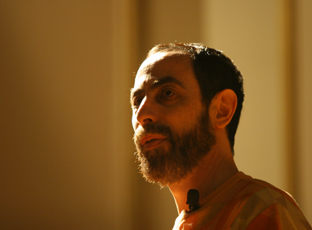World class poker player returns to roots

Barry Greenstein, a University alumnus, mathematician, and world-renowned poker player, speaks at Foellinger Auditorium on Thursday. night. Greenstein graduated in computer science and completed graduate work in mathematics, only to become a professional Josh Birnbaum
November 4, 2005
He walked inconspicuously in the dark with no throngs of fans or camera flashes to penetrate the silence, retracing his footsteps to the familiar building that rung the same as it did when he was an undergraduate in computer science and a graduate student in mathematics.
In the past few decades former University graduate, Barry Greenstein became one of the best poker players in the world and the “Robin Hood of Poker” with his generous donations to charities.
Thursday night, Greenstein left in the middle of his High Stakes Poker tournament in Las Vegas to revisit his alma mater and speak at Foellinger Auditorium. Throughout his talk, Greenstein drew upon his academic experience, emphasizing the importance of learning in college.
“I’ve had some good steps and some bad steps,” he said. He admitted to “playing too much poker,” which he said explains why he never finished his Ph. D. in mathematics at the University.
“While you’re here, learn as much as you can,” Greenstein said. “Most of what I learned was here at the University.”
Get The Daily Illini in your inbox!
In 1984, Greenstein worked as a programmer at Symantec until he devoted his entire career to poker in 1991. A typical year for Greenstein involves fifty days for side games and fifty for cash and tournament games. Greenstein said he pursued poker because he wanted to be his own boss and determine his own hours.
“A job is still a job,” he said before the speech. “It is the job I am able to make the most money at.”
While renowned for his poker wins, he is also hailed for his generosity, donating his entire tournament proceeds to various charities. Charities include Children, Incorporated, which is his primary recipient, and the University, to which he has donated $100,000 to graduate studies in mathematics.
During the talk, Greenstein explained how he applied his education to his career and life.
“Math carried over into poker,” he said. “It taught me how to handle failure.”
Greenstein’s son, Joe Sebok said he learned to not quit or give up from his father. Sebok, who also plays professionally, said he likes the competitive aspect of the game. The mathematical aspect of the game is minimal, Sebok said.
“You need to know how different people are going to react in different situations,” he said.
Billy Joe Mills, senior in LAS who has played poker for a year, said Greenstein distinguished himself from other players because he discussed the “cynical” side of poker. Greenstein revealed the reality of poker, Mills said. His talk “coincided with my thoughts that I shouldn’t be playing as I do,” he said.






